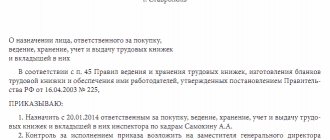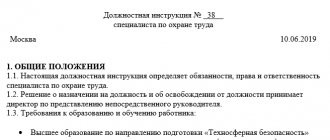Why responsibility lies with the leader
The manager's responsibility for organizing accounting includes:
- clause 1 art. 7 of Law No. 402-FZ;
- clause 6 of the order of the Ministry of Finance of Russia dated July 29, 1998 No. 34n.
Thus, it is the head of the company who is responsible for organizing accounting. However, neither the law nor the order deciphers what exactly is meant by such an organization. The phrase can be found only in the Standard Recommendations for the Organization of Accounting for Small Businesses (approved by Order of the Ministry of Finance of the Russian Federation dated December 21, 1998 No. 64n).
The formulations for small businesses inherently reflect all the conclusions that can be drawn for medium and large businesses from other documents regulating accounting in the Russian Federation.
The head of the company often does not personally maintain accounting records, and in some cases due to a direct prohibition that they are required to comply with, for example:
- joint-stock companies (clause 4 of article 7 of law No. 402-FZ);
- companies not named in clause 3 of Art. 7 of Law No. 402-FZ (not entitled to simplified forms of accounting, medium-sized businesses participating in auctions, insurance organizations, etc.).
In fact, the head of the company is responsible for the lack of accounting in the organization, however, he is not obliged to personally maintain accounting if he has provided the conditions for:
- obtaining timely and reliable accounting information;
- exercising control over the company's activities.
In order to ensure these conditions, very specific measures are needed to organize the components of the accounting system.
Whom to appoint
To decide who is responsible for road safety in an organization and whether it is worth hiring outside personnel for this or whether you can do it yourself, you need to proceed from the number of employees servicing the vehicle fleet. If there are more than 50 of them, it is better to create a separate bet. When there are 50 or fewer drivers, the duties of the person responsible for road safety can be assigned additionally to one of the employees, and if there are no volunteers, a part-time specialist can be hired.
Enterprises with large fleets specializing in transportation often create entire services to ensure road safety. It is important to take into account that all appointed employees must meet the qualification requirements outlined in Order No. 287, and only the supervisor needs to be certified.
What accounting activities are the manager responsible for?
Regardless of whether the head of the company does accounting personally or not, he is responsible for:
- primary accounting and document flow;
- carrying out inventories;
- approval of the Chart of Accounts (if the company does not apply the most simplified accounting provided, in particular, for micro-enterprises), accounting forms, volume and content of reporting forms.
However, the role of the head of the company can actually be reduced to such activities as:
- introduction of accounting positions into the company's staff (at least one accountant);
- creation of an accounting department with a chief accountant;
- outsourcing of accounting.
If the choice met all the criteria of the law, then the manager has a chance to share responsibility, ensuring strict compliance with the requirements of the person he has chosen for the primary accounting documents.
Direct executors of the requirements:
- structural divisions of the company;
- financially responsible employees.
Ensuring such conditions does not require the head of the company to have in-depth knowledge of accounting.
More details
Requirements for those responsible for fire safety
At the legislative level, there are no strict requirements for the education and specialization of the employee responsible for fire safety. Often this role is assigned to a health and safety specialist, head of the safety department or other employees in management positions.
To be appointed to this position, the employee must meet the following requirements:
- Work experience of three years;
- holding a leadership position in the business entity in question;
- understanding of the seriousness of the position and a high level of self-discipline;
- study and continuous improvement of knowledge in the field of fire safety;
- ability to use primary fire extinguishing equipment;
- ability to provide first aid.
Preference is given to experienced workers who know the technological process from the inside, understand the operating features of the equipment and possible risks.
Before taking up duties, the person in charge must undergo training to master the fire-technical minimum at a specialized center.
On a note! For a fire to occur, the interaction of three components is required: a flammable medium, an ignition source and oxygen. If at least one of the listed elements is missing, a fire will not occur. The person responsible for fire safety should be aware of this.
Arbitrage practice
Current legislation does not provide clear answers to any of the following questions:
- Is it possible to share responsibility for organizing and maintaining accounting records (with the exception of subsidiary liability in bankruptcy cases)?
- What is the responsibility of the head of the organization for maintaining accounting records?
For their solution, the main guideline is only judicial practice.
Thus, the manager will most likely be held accountable if the court does not have evidence that:
- accounting in the company was carried out by a person who complies with the requirements of the law (Resolution of the Supreme Court of the Russian Federation dated December 25, 2018 N 127-AD18-5);
- the manager organized the storage of accounting documents (Decision of the Supreme Court of the Russian Federation dated July 3, 2018 N 307-ES18-8193 in case N A56-71346/2013);
- the accountant had access to the keys from the client bank (Resolution of the Arbitration Court of the North-Western District dated November 12, 2015 No. A05-11992/2012).
Let us note that the former head of the company will not escape liability (Resolution of the Arbitration Court of the Far Eastern District dated January 11, 2019 N F03-5750/2018 in case N A51-8910/2016). Until now, the courts apply the resolution of the Plenum of the Armed Forces of the Russian Federation dated October 24, 2006 No. 18 on the division of responsibility. The court recognized the objectivity of the difference in such labor duties as:
- accounting organization (manager);
- correct accounting (accountant).
Since the performance (non-performance) of these duties may result in the same result, the designated company employees may be jointly responsible for:
- errors in accounting;
- legal consequences of accounting errors.
However, if an error occurred, for example, due to a corresponding written order from the head of the company (Clause 8, Article 7 of Law No. 402-FZ), then it is not the accountant who will be responsible for it. But responsibility for late submission of reports can be shifted to the accountant (Resolution of the Supreme Court of the Russian Federation dated 03/09/2017 No. 78-AD17-8).
Interesting fact
An accountant can avoid financial liability for late submission of reports even if such liability is included in the employment contract (Appeal ruling of the Moscow City Court dated December 14, 2017 No. 33-51403/17). According to the judges, such a violation: cannot be attributed to direct actual damage (Part 2 of Article 238 of the Labor Code of the Russian Federation); does not correspond to the concept of losses compensated by the employee (clause 2 of article 15 of the Civil Code of the Russian Federation). In such cases, the head of the organization not only bears administrative responsibility (which can be challenged), but also undoubted material losses.
Which business entities are required to keep accounting records?
In accordance with the provisions of Art. 6 of the Law “On Accounting” dated December 6, 2011 No. 402-FZ, all types of business entities are required to maintain accounting records, except:
- Individual entrepreneurs (subject to accounting for their own income and expenses using other methods provided for by tax legislation);
- structural divisions of foreign companies operating in Russia (subject to keeping records of revenue and costs in accordance with tax legislation).
The organization must keep accounting records from the moment of state registration until the termination of its activities. Failure to fulfill this statutory obligation threatens the company with legal consequences in the form of measures established in Art. 120 of the Tax Code of the Russian Federation (fine) and Art. 15.11 Code of Administrative Offenses of the Russian Federation (fine or disqualification of officials).
It is in the interests of the company to maintain correct accounting. Who should be responsible for its organization?
Who is responsible for accounting outsourcing?
If the accounting department is transferred to a specialized company, it is much easier to determine the responsible person than in other cases
An agreement for the provision of accounting services is, in essence, an ordinary contract for the provision of services for a fee (clause 2 of Article 779 of the Civil Code of the Russian Federation).
When concluding such an agreement, it is necessary to take into account that:
- if tax violations are detected, the inspector will calculate the arrears (penalties, fines) of the company from which the violations were found, and not to a third party who maintains accounting records and submits reports (Article 106 of the Tax Code of the Russian Federation);
- freedom of contractual relations allows us to formulate a condition for compensation of tax sanctions.
Of course, placing the blame on a third party – a company providing accounting services – will not work if:
- false documents were submitted for accounting;
- some of the primary accounting documents were not provided by the customer;
- the customer interacts with the bank independently and, despite receiving timely information, transferred taxes late (for personal income tax in this case there will be not only penalties, but also a 20% fine on the unpaid amount).
At the same time, the guilt of the accounting services provider is obvious if additional charges occurred due to the fact that:
- reporting deadline;
- rules for determining tax amounts;
- archiving procedure, due to which the loss (damage) of documents occurred.
However, despite the obviousness, it is better to stipulate the relevant conditions in the contract.
The contract for accounting services in 1C-WiseAdvice stipulates that we compensate the client for all financial losses resulting from incorrect calculation of taxes, errors in accounting and reporting made by our specialists, late submission of reports, etc. Moreover, unlike most accounting companies, we bear financial responsibility for 3 years from the date of submission of reports (even if the Service Agreement has already expired).
These formulations allow our clients to almost completely minimize their risks.
When outsourcing accounting, you also need to know:
- an exact list of services (it can be specified in the subject of the contract or in its appendix);
- document flow procedure, including an inventory of transferred documents;
- algorithm for interaction with the contractor in controversial cases that arise when documents contain errors or cannot be submitted to the tax authorities on time.
That is, in order to count on compensation from the accounting services provider, the manager must clearly understand what part of the accounting he has outsourced and what responsibility the outsourcer bears in the event of poor quality performance of his services, because Many companies prescribe amount limits for damage compensation when providing accounting services.
Violation of work duties by an accountant: consequences
If the chief accountant's crimes are discovered after he leaves work, he is still punished. In this case, they go to the judicial authority and file a claim within 12 months from the date of discovery of a specific offense.
The countdown of the one-year period begins from the day the criminal act is detected, not committed by the chief accountant. In this situation, the court is provided with facts and documented evidence that a crime was detected on a specific day.
Limitation periods
According to Art. Code of Administrative Offenses of the Russian Federation, the statute of limitations for the application of various administrative penalties does not exceed 2 months from the date of their appointment. This period of time for criminal offenses is spelled out in detail in Art. Criminal Code of the Russian Federation.
The period for bringing chief accountants to criminal liability is equal to the following indicators:
- 2 years - for minor offenses;
- 6 years - for committing various crimes of medium gravity;
- 10 years - when committing serious illegal acts;
- 15 years - for committing especially serious crimes.
Article 78 of the Criminal Code of the Russian Federation “Exemption from criminal liability due to the expiration of the statute of limitations”
Article 4.5 of the Code of the Russian Federation on Administrative Offenses “Limitation period for bringing to administrative responsibility”
The new chief accountant does not bear any responsibility for the crimes of the previous official. Only the culprits themselves are punished, not new employees.
After dismissal from work, the former chief accountant is also subject to various types of administrative liability (Articles 1.5, 2.4 of the Code of Administrative Offenses of the Russian Federation).
Delay of a salary is considered a financial crime, for which the head of the company and the chief accountant bear personal responsibility. IN
We suggest you familiarize yourself with: Avoiding obstacles in the oncoming lane. Detour rules in 2020.
Various officials are responsible for delay or non-payment of salary. It depends on the crime:
- if the salary is not paid due to lack of money in the company account, the manager is punished;
- If there are funds on the company's balance sheet, various penalties are applied to the chief accountant.
In the above situations, administrative penalties are applied to both the chief accountant and the manager. In this case, they are issued fines.
If the chief accountant violates his duties typical of his position, he may be held accountable in accordance with labor, administrative and criminal laws.
The chief accountant may be held liable under labor law on the basis of:
- Art. 192 of the Labor Code of the Russian Federation (possible sanctions - reprimand, reprimand, dismissal);
- clause 9 art. 81 of the Labor Code of the Russian Federation (possible sanction - dismissal);
- Art. 243 of the Labor Code of the Russian Federation (possible sanction - recovery of compensation by the company for material damage).
Provisions of Art. 192 of the Labor Code of the Russian Federation can be applied by the employer in the event of direct failure by the accountant to fulfill the duties established by the employment contract or his job description.
Norms of paragraph 9 of Art. 81 of the Labor Code of the Russian Federation, the employer has the right to apply if the accountant makes one or another decision that will entail damage to the company’s property or the unlawful use of this property.
Sanctions provided for in Art. 243 of the Labor Code of the Russian Federation, can be applied to the chief accountant if he:
- caused material damage to the company due to failure to fulfill obligations;
- allowed a shortage of material assets that were entrusted to him;
- intentionally caused damage to the company;
- caused damage in the company under the influence of alcohol or drugs;
- caused damage by committing a crime, administrative offense;
- allowed the disclosure of trade secrets;
- caused damage to the company outside the period of performance of labor duties.
In addition, the employment contract may establish other criteria for the occurrence of financial liability of the chief accountant.
IMPORTANT! Financial responsibility in full can be assigned to the chief accountant, provided that this is established by the employment contract. If the employment contract does not stipulate that the chief accountant bears financial responsibility in full in the event of damage, then liability for the damage caused can be recovered only in the amount of his average monthly earnings (clause 10 of the resolution of the Plenum of the Supreme Court dated November 16, 2006 No. 52).
If we talk about administrative liability, then, based on the provisions of Art. 15.11 of the Code of Administrative Offenses of the Russian Federation, an accountant as an official in the event of a gross violation of accounting (in accordance with the criteria established by clause 2 of Article 15.11 of the Code of Administrative Offenses of the Russian Federation) may be:
- fined 5,000–10,000 rubles;
- fined 10,000–20,000 rubles or disqualified for 1–2 years if the violation is repeated.
ATTENTION! In 2020 in Art. 15.11 of the Code of Administrative Offenses of the Russian Federation, changes were made to provide for the possibility of releasing an accountant from liability if he made accounting errors due to the fault of third parties. We talked about them in detail in this article.
The chief accountant may be brought to criminal liability on the basis of Art. 199, 199.1, 199.4 of the Criminal Code of the Russian Federation. The standards established by these articles apply if, due to the actions of an accountant, the company was found to have evaded paying taxes and insurance premiums. Possible sanctions:
- fine;
- arrest;
- deprivation of liberty.
The sanctions become more severe if it is proven that the crime was committed by several employees of the company by prior conspiracy, or if tax evasion on a particularly large scale is revealed.
Responsibility under Art. 199 of the Criminal Code of the Russian Federation, the chief accountant is liable only if fraud with large sums is proven, carried out intentionally or in conspiracy with the manager (paragraphs 7, 8 of the resolution of the plenum of the Armed Forces of the Russian Federation dated December 28, 2006 No. 64).
Professional responsibility
It is generally accepted that no one is immune from the main cause of liability for accounting errors - the human factor. Meanwhile, companies providing accounting services have the opportunity to compensate for the losses of their clients, not least thanks to professional activity insurance.
Professional insurance is valid for services related to the use of professional knowledge and experience. An insured event in this case may well be incorrect accounting of the expenses of the customer for accounting services, which led to an increase in the tax base. Of course, no one will insure for errors caused by forged documents or their deliberate absence. However, professional errors mean not only conscientious errors, but also negligent actions (inaction) committed by the insured person.
Thus, only unintentional actions (omissions) can be classified as errors (omissions). The list of types of professional activities for which liability insurance can be provided is not strictly limited. And yet, it is unlikely that any insurance company will enter into an agreement to insure the chief accountant, since he works under an employment contract and performs his duties, and does not provide services.
The professional liability insurance contract, developed by our company together with, includes an expanded list of risks that are not covered by the standard policy and are not insured by most other accounting companies. Due to the growth of the client base, the amount of insurance coverage increases annually. This gives our clients the guarantee that even in the event of serious financial damage, we will be able to compensate them in full.







